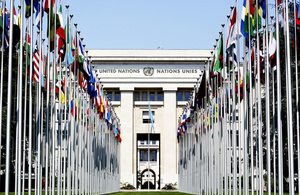UN Human Rights Council 43: UK's closing statement
Lord Ahmad of Wimbledon welcomes conclusions of the 43rd Session of the UN Human Rights Council

The Human Rights Council takes place in Geneva.
The 43rd session of the UN Human Rights Council reconvened from 15 to 22 June following its suspension on 13 March due to COVID-19. It is a testament to the hard work and creativity of the HRC President and the HRC Secretariat that the session was able to resume, including in a partly virtual format. Now more than ever, the work of the Council to promote and protect human rights around the world is essential.
COVID-19, and the measures needed to combat it, will have a profound effect on individuals and societies, and impact on people’s enjoyment of their human rights. As we tackle this crisis together, states must respect their human rights obligations, take steps to mitigate its disproportionate effects on the most vulnerable in our societies, and actively include women and disadvantaged groups in the response and recovery.
The global protests following the tragic killing of George Floyd have shown we all need to work harder to combat racism. During the reconvened session, and during an Urgent Debate on the subject, the UK reaffirmed our commitment to doing just that. Internationally, we will continue to be one of the strongest advocates for those United Nations mechanisms that help to combat racism. At home, we will work to create a fair society where all people, regardless of ethnic origin or background, are valued and able to participate fully.
The UK delivered a national statement setting out our serious concerns on Hong Kong. China’s plan to impose national security legislation on Hong Kong would undermine Hong Kong’s autonomy and could threaten its rights and freedoms. The imposition of the proposed law lies in direct conflict with China’s international obligations under the Joint Declaration. We urge China to engage with Hong Kong’s people, institutions, and judiciary to ensure it maintains Hong Kong’s high degree of autonomy and rights and freedoms.
I welcome the adoption of the resolution establishing an independent, international fact finding mission in Libya, with Libya’s cooperation. This represents much-needed progress towards accountability for all human rights violations and abuses, and violations of international humanitarian law, amid concerning reports of reprisal attacks, continuing civilian casualties and the existence of mass graves. All parties must commit to a ceasefire and return to the UN-led political process.
I am delighted that the Council renewed, by consensus, the mandate of the UN Commission on Human Rights in South Sudan, with South Sudan’s constructive cooperation. With significant increases in intercommunal violence, systemic sexual and gender-based violence and a dire humanitarian situation exacerbated by COVID 19, the Commission plays a vital role in monitoring human rights, tackling impunity and supporting implementation of South Sudan’s peace deal. We look forward to the Transitional Government’s continued cooperation.
I am pleased that once again the Council adopted a resolution on Syria, renewing the mandate of the Commission of Inquiry. The human rights situation there remains of grave concern. All parties must abide by the agreed ceasefires, and by international law, in order to protect civilians.
I welcome the adoption of the resolution on the situation of human rights in Myanmar. I urge the authorities to implement the recommendations of the Rakhine Advisory Commission, the Independent Commission of Enquiry and to comply with the ICJ’s provisional measures. This is essential to create the conditions for voluntary, safe and dignified returns. We strongly support the Independent Investigative Mechanism for Myanmar.
The UK opposes the proposed annexation of any parts of the West Bank and we remain committed to a two state solution. We support justified scrutiny of Israel and the OPTs under appropriate agenda items, but continue to be concerned by the Council’s disproportionate focus on Israel.
I also welcome the renewal of the mandates of the Special Rapporteur on the human rights situation in the DPRK, the Independent Expert for Mali, the Special Rapporteur on human rights in Iran, and the resolution on the human rights situation in Nicaragua. I am pleased that the HRC adopted a resolution on the continuing technical co-operation on human rights monitoring in the Georgian regions of South Ossetia and Abkhazia.
In these extraordinarily difficult times, the Human Rights Council plays a crucial in bringing states together to protect and promote human rights. The UK will seek election to the Council later this year, in a reaffirmation of our strong commitment to work to with the Council to hold to account those who violate and abuse human rights.